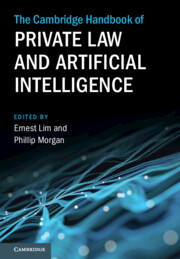
-
Select format
-
- Publisher:
- Cambridge University Press
- Publication date:
- March 2024
- March 2024
- ISBN:
- 9781108980197
- 9781108845595
- Dimensions:
- (254 x 178 mm)
- Weight & Pages:
- 1.48kg, 700 Pages
- Dimensions:
- Weight & Pages:
You may already have access via personal or institutional login
Book description
AI appears to disrupt key private law doctrines, and threatens to undermine some of the principal rights protected by private law. The social changes prompted by AI may also generate significant new challenges for private law. It is thus likely that AI will lead to new developments in private law. This Cambridge Handbook is the first dedicated treatment of the interface between AI and private law, and the challenges that AI poses for private law. This Handbook brings together a global team of private law experts and computer scientists to deal with this problem, and to examine the interface between private law and AI, which includes issues such as whether existing private law can address the challenges of AI and whether and how private law needs to be reformed to reduce the risks of AI while retaining its benefits.
Reviews
‘This Handbook is timely and significant, with no other work considering with such insight the interface between AI and private law. The Handbook asks the challenging questions for private lawyers and seeks to provide answers, both as to how private law will need to adapt to meet the challenges and fulfil the potential of AI but also what role private law will need to play to control and regulate AI. The editors have brought together private lawyers and computer scientists from around the globe to reflect on these important issues. I have no doubt that this Handbook will be both ground-breaking and influential.'
Graham Virgo KC (Hon) - Professor of English Private Law, University of Cambridge
‘AI is now an everyday topic of conversation. All lawyers and policy-makers need to think about the issues raised. This multi-authored book will be invaluable in assisting them to do so. It is the first book dedicated to the role of AI in relation to private law. It makes a fascinating read whether dipped into or taken as a whole. Within its pages, the reader will find the familiar areas of private law, such as contract, tort, property law and commercial law, excitingly exposed to the full glare of the AI revolution.'
Lord Burrows FBA - Justice of the United Kingdom Supreme Court
‘If artificial intelligence stands to remake society – as its greatest proponents and critics both claim-then among the things that must change are law and legal institutions. This book – featuring an international and interdisciplinary cadre of some of the wisest contemporary voices on AI law – will be indispensable to the faculty, students, and policymakers engaged in this effort.'
Ryan Calo - Lane Powell and D. Wayne Gittinger Professor, The University of Washington School of Law
‘This Handbook brings together an impressive team of contributors to offer a panoramic view of the interface between private law and AI. At this already disrupted interface, we now see AI-enabled processes and products generating a broad sweep of new questions for private law as well as AI tools that are insinuating themselves into governance practices. If we want to understand more about why, where, and how the tectonic plates of private law governance are being put under stress during this time of extraordinary development of AI, this Handbook is one to read.'
Roger Brownsword - Professor of Law, King's College, London
‘Our social and economic environment is increasingly saturated with AI. Covering a wide range of timely topics, this rich Handbook carefully examines some of the most important challenges that AI poses for private law. Benefitting from the perspective of multiple jurisdictions, it explores some of the most significant risks and opportunities as well as the possible reforms required in order to properly recalibrate private law. This exciting Handbook is thus an essential resource for private law scholars, lawmakers, and practitioners in the AI era.'
Hanoch Dagan - Professor of Law, UC Berkeley School of Law
‘It's vital to track and, to the extent possible today, understand the complex and evolving intersection of AI and private law. This Handbook is a valuable resource for those both newly interested and long-standing experts, exploring legal issues alongside technological challenges that call for policy response.'
Jonathan Zittrain - Professor of Law, Computer Science and Public Policy, Harvard University; co-founder, Berkman Klein Center for Internet & Society
‘Social change drives legal change. Statutes respond to new social problems and court decisions resolve disagreements between litigants whose interactions are conditioned by evolving social context. The causal flow also goes the other way: legislation and judgments aim to alter social relations and sometimes have this effect (though not always in the way that lawmakers intend). Technological developments provide well-known examples of these phenomena and developments in artificial intelligence are set to do the same, in more or less-predictable ways. Until now, the focus of academic discussion of the interplay between AI and the law has been on regulation, but as the wide-ranging contributions to this important new volume make clear, the interplay between AI and private law is another rich field for scholarly examination.'
Charles Mitchell KC (Hon) - FBA, Professor of Laws, University College London
Contents
Metrics
Altmetric attention score
Full text views
Full text views help Loading metrics...
Loading metrics...
* Views captured on Cambridge Core between #date#. This data will be updated every 24 hours.
Usage data cannot currently be displayed.
Accessibility standard: Unknown
Why this information is here
This section outlines the accessibility features of this content - including support for screen readers, full keyboard navigation and high-contrast display options. This may not be relevant for you.
Accessibility Information
Accessibility compliance for the PDF of this book is currently unknown and may be updated in the future.


